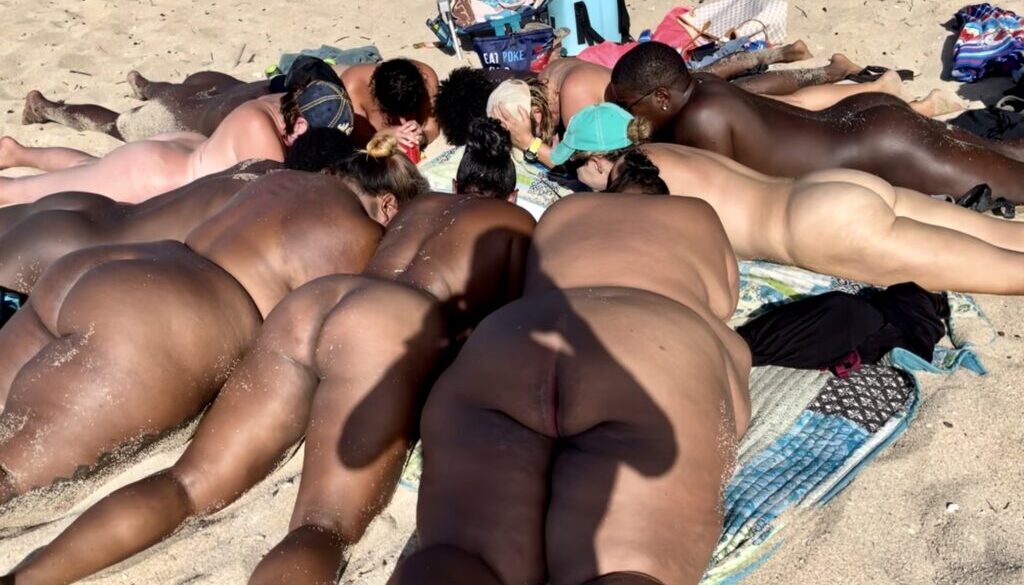The Practice of Social Nudity
Naturism, a lifestyle embracing the practice of social nudity, has long been a beacon of freedom and authenticity for its adherents. Stripping away not only their clothes but also societal expectations, naturists find solace in the skin they’re in, advocating for a life unencumbered by the constraints of fashion and the judgements of others. At its core, naturism is about more than just being naked; it’s about the power of casual nudity to foster self-acceptance, challenge norms, and redefine body positivity. This article delves into the world of naturism and the profound impact it has on those who choose to live life au naturel.
Naturists Find Freedom in Nudity
For many naturists, the act of shedding clothes is synonymous with shedding worries and insecurities. The freedom that comes with being nude is not just physical but psychological, allowing individuals to release the burdens of daily life. In a naturist setting, there are no designer labels or fashion statements to hide behind, creating a level playing field where social status is left at the door. This sense of liberation is a key draw for those seeking an escape from the pressures of a materialistic world.
In naturist communities, the human body is celebrated in all its forms. There’s a refreshing honesty in the way naturists interact, free from the pretenses that often accompany clothed socializing. Without the barriers of clothing, conversations tend to be more open and authentic, as individuals connect on a deeper, more genuine level. This freedom extends beyond social interactions, as naturists often express feeling more at one with nature and their surroundings when nude.
The freedom found in nudity also extends to movement and physical comfort. Clothes can be restricting, and being able to move without them allows for a sense of physical liberation that many find exhilarating. Activities like swimming, hiking, or even gardening take on a new dimension when experienced in the nude, as the body is allowed to function without constraint. It’s this sense of freedom that continues to attract people to the naturist lifestyle.
Unveiling Authenticity Through Nudity
Nudity has a way of stripping down pretenses and exposing the authentic self. In a world where so much value is placed on outward appearances, the naturist lifestyle offers a refreshing alternative. By choosing to be nude, naturists are making a bold statement about the importance of being true to oneself, regardless of societal expectations. This authenticity extends to the acceptance of one’s body, flaws and all, which can be deeply empowering.
The naturist philosophy posits that when we remove our clothing, we also remove the masks we wear in everyday life. This can lead to more honest and meaningful interactions, as individuals are seen for who they truly are, rather than who they appear to be. This level of authenticity is rare in modern society, where image often trumps substance, making naturism a powerful counter-culture movement.
Embracing nudity is also about embracing honesty. In a naturist environment, there is no hiding; everything is out in the open, quite literally. This can be a daunting prospect for newcomers, but it’s also incredibly liberating. By accepting and presenting themselves just as they are, naturists cultivate an environment of trust and openness that is the cornerstone of their communities.
The Power of Casual Nudity
Casual nudity, the practice of being nude in non-sexualized, everyday settings, is central to the naturist experience. It’s an act that defies convention, but for naturists, it’s a powerful expression of freedom and equality. In a society where nudity is often sexualized or sensationalized, the nonchalant attitude naturists have towards being naked is revolutionary. It challenges the notion that nudity must be private or shameful, instead presenting it as a natural and unremarkable state of being.
The power of casual nudity lies in its ability to normalize the human body in all its diversity. By frequently encountering nudity in non-sexual contexts, naturists desensitize themselves to the shock value that society often attaches to the naked form. This fosters a more accepting attitude towards bodies of all shapes, sizes, and ages, and can significantly reduce body image issues that plague so many people.
Moreover, the practice of casual nudity can also serve as a form of silent protest against the hyper-sexualization of bodies in media and advertising. By reclaiming nudity as a state of comfort and normalcy, naturists push back against the objectification and commodification of the human form. This perspective challenges individuals to rethink their relationship with their own bodies and with nudity in general.
Embracing Vulnerability with Naturism
Naturism requires a certain level of vulnerability, as individuals expose not only their bodies but also their insecurities. This vulnerability is not seen as a weakness within the naturist community, but rather as a strength. It takes courage to stand naked in front of others, but in doing so, naturists demonstrate a confidence and self-assuredness that is deeply admirable. By embracing their vulnerability, they find a sense of solidarity and camaraderie with fellow naturists.
This vulnerability also leads to a more profound sense of empathy and understanding among naturists. Seeing others in their most natural state can evoke a recognition of shared humanity, breaking down barriers and fostering a deeper connection. It’s an experience that can be both humbling and enlightening, encouraging individuals to be more compassionate and accepting of others.
Moreover, the act of being naked and vulnerable in front of others can lead to significant personal growth. It can be a cathartic experience, helping individuals to confront and overcome body image issues and to develop a more positive relationship with their physical selves. In a society that often equates vulnerability with weakness, naturists offer a powerful counter-narrative that celebrates openness and honesty.
Nudity: A Path to Self-Acceptance
For many naturists, nudity is more than just a lifestyle choice; it’s a path to self-acceptance. By embracing their bodies without shame or judgement, they learn to appreciate their physical form for its functionality and beauty, rather than for how it conforms to societal standards. This acceptance can lead to a more positive body image and a healthier relationship with oneself.
The journey to self-acceptance through nudity is not always easy. It requires individuals to challenge deeply ingrained beliefs about modesty, decency, and self-worth. However, the rewards of this journey can be transformative. Naturists often report feeling more comfortable and confident in their own skin, and this confidence can extend into other areas of their lives.
Moreover, the practice of social nudity provides a supportive environment where individuals can explore and come to terms with their bodies. Surrounded by others who are also on a path to self-acceptance, naturists can find reassurance and encouragement. This communal aspect of naturism is a powerful force in helping individuals to embrace their bodies and, ultimately, themselves.
Breaking Societal Norms with Naturism
Naturism is inherently subversive, challenging societal norms that dictate how bodies should be covered and concealed. By choosing to be naked in social settings, naturists defy the conventions that associate nudity with sexuality or impropriety. This defiance is a deliberate act of resistance against a culture that often oppresses natural human expression.
The choice to engage in naturism is a political one, whether or not individuals consciously frame it as such. It’s a statement about personal freedom, autonomy, and the right to exist in one’s natural state without shame. In a society that polices bodies, particularly those of women and marginalized groups, naturism can be a radical act of reclaiming control over one’s own body.
Additionally, naturism confronts the pervasive influence of consumerism and the fashion industry. By rejecting the need for clothing as a status symbol or a marker of identity, naturists critique the notion that self-worth is tied to material possessions. This can be a deeply liberating realization, allowing individuals to find value in who they are rather than what they wear.
Naturists Redefine Body Positivity
The naturist movement is at the forefront of redefining body positivity. By embracing nudity, naturists promote an inclusive and accepting view of all body types. This perspective stands in stark contrast to mainstream media’s narrow and often unrealistic standards of beauty. In naturist communities, bodies are not judged or compared but are instead celebrated for their uniqueness.
Body positivity within naturism also extends to aging and the changes that come with it. Instead of hiding or feeling shame about the natural aging process, naturists view it as a part of life to be embraced. Wrinkles, scars, and other so-called imperfections are not seen as flaws but as stories written on the body, each telling a tale of a life lived.
Furthermore, naturism can help dismantle the harmful stereotypes and prejudices that often surround bodies of different shapes and sizes. By creating a space where all bodies are accepted and respected, naturists contribute to a more inclusive and compassionate society. It’s a body-positive ethos that has the potential to resonate far beyond the confines of naturist communities.
The Rise of Naturism in Modern Society
Naturism is experiencing a resurgence in modern society, as more people seek to disconnect from the digital world and reconnect with their natural selves. The stresses of contemporary life, along with the constant bombardment of idealized body images, have led many to seek refuge in the simplicity and authenticity of the naturist lifestyle. This trend is reflected in the increasing number of naturist resorts, beaches, and events around the world.
The rise of naturism also speaks to a growing desire for greater connection and community. In an age where social interactions are often mediated by screens, the face-to-face, unadorned interactions of naturist settings offer a welcome change. People are drawn to the sense of belonging and acceptance that naturist communities provide, along with the opportunity to engage in activities that promote health and well-being.
Additionally, the environmental aspect of naturism cannot be overlooked. As society becomes more conscious of sustainability and the impact of consumption, the naturist ethos of living simply and in harmony with nature resonates with a wider audience. By forgoing clothing, naturists reduce their environmental footprint and promote a way of life that is more in tune with the natural world.
Conclusion
Naturism is more than just a preference for nudity; it’s a movement that embraces authenticity, vulnerability, and self-acceptance. Through the power of casual nudity, naturists challenge societal norms, redefine body positivity, and foster a sense of freedom and community. As the world grapples with issues of body image, consumerism, and disconnection, the principles of naturism offer a compelling alternative. The rise of naturism in modern society reflects a deep-seated desire for a more genuine way of living—one that celebrates the human body in all its natural glory.
External Mental Health Resources
Sexual Repression
Benefits of Nudism
Read Top 10 Benefits of Nudism by Marc of Nude and Happy
- Read The health benefits of being naked: How stripping down is good for you by Jordi Lippe-McGraw of Today
- Read Exploring the Benefits of Nudism: A Look at the Positive Aspects of Going Clothes-Free of Allo Health
- Read 12 Benefits of Nudism by Gary Holden of AANR
- Read Surprising Health Benefits of Being Naked by Elizabeth Marglin of The Upside
- Read 10 Ways Naturism Is a Healthy Lifestyle by Joseph Duprey of Listverse
That concludes this Pink Paper.
Browse our Categories of Pink Papers:
Featured Image:

Featured Image Credit:
An iPartyNaked photo by Naked Jesus. © iPartyNaked.com. All Rights Reserved.
Check out these Pink Papers:
These Pink Papers are Pillar Content, and we think they’re interesting.















































